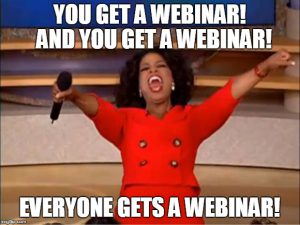 Webinars can help you achieve a number of marketing objectives… building awareness for your firm, positioning you (the presenter) as a Subject Matter Expert and, of course, generating sales leads. We like webinars so much, we started our own program this year.
Webinars can help you achieve a number of marketing objectives… building awareness for your firm, positioning you (the presenter) as a Subject Matter Expert and, of course, generating sales leads. We like webinars so much, we started our own program this year.
And as we’ve gotten into this program, we’ve learned 4 key lessons that can be helpful to anyone with webinars in their marketing & sales plan.
Pick the right topic
Yeah, I know… it seems sort of obvious. But it’s not as easy as you think.
First, you need to know your audience. Are you trying to attract corporate researchers, brand managers, marketing executives, etc.? From what kinds of companies? Any particular industries? The audience you want to target will help determine which topics you select.
But more importantly… you need to select a topic that your target audience wants to learn about – not just one that you want to present. If your webinar does not have a compelling answer to your audience’s question, “What’s in this for me?,” no one will register for it… or if they do, they’ll log off long before you finish.
Give them a little face time
Your webinar is meant to help inform and educate the audience. But it’s also about positioning your firm – and YOU, specifically – as a Subject Matter Expert. To help the attendees connect with you as that expert, spend a little time, during the webinar, talking directly to them through a webcam – even if just for a couple of minutes.
If they can’t meet you in-person, at least they can “meet” you this way. People connect with other people… not with PowerPoint decks. So, give them that opportunity.
Note: when you do this, make sure your office background (behind you while on camera) is tidied up.
Over communicate
There are two kinds of communication you’ll need to manage to have a successful webinar… pre-event marketing and registrant communication.
- For marketing… promote your webinar like crazy! Use email marketing, update your website (an easy-to-see ‘banner’ on your home page and a strong landing page), post on social media (not just on your social sites, but in every LinkedIn group you belong to), use digital ads (try LinkedIn ads – they’re easy and inexpensive) and take advantage of 3rd-party Calendar Listings (e.g. in the Quirk’s online events calendar).
- For registrant communication… make sure you send a registration confirmation immediately after someone registers. Then, in the days leading up to the event, make sure to send several reminders, including the log-in/call-in information (we do this one week out, 1 day out and the morning of). Also, don’t forget about post-event communications (a “thank you for attending” note, a “sorry we missed you” note, sending a link to the recording, asking them to complete a survey, etc.).
Practice makes perfect
You can’t just walk in the morning of the webinar and expect to deliver a memorable webinar (well, it might be memorable – but for the wrong reasons!). You’ve got to spend some time practicing… and there are three things to include in your practice time:
- The presentation itself. Make sure you know your slide deck inside-out and what you plan on saying for each of them. The more you practice, the more natural/less scripted you’ll sound.
- Questions & answers. As you’re developing your deck, think about any possible questions you might get from the attendees… and think through how you will respond. That way, you won’t fumble your answers – instead, you’ll come across authoritatively.
- The webinar platform. Whichever platform you’re using – and there are scores to choose from – make sure you’re a pro at it. There’s nothing worse than clicking on the wrong button during the presentation and not being able to get back to where you should be.
Not only did I practice like crazy before we kicked off our program, I still make sure to practice at least twice before each of our webinars, no matter how often I present.
Final comment
“Think first to help… then to sell.”
Webinars can be a really outstanding marketing vehicle for your firm and an important catalyst for your sales pipeline. But even if you follow all of the guidelines above, you will still mess it up if you turn it into an online sales pitch. Do that, and you lose all credibility. Think of a webinar, not as a selling opportunity, but as an educational opportunity and a chance for prospective clients to learn a little about you and your areas of expertise.
It’s that understanding that will become the attendee’s first step in their buying process with you.
Good luck.

